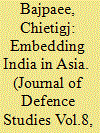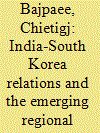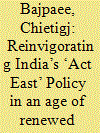| Srl | Item |
| 1 |
ID:
134038


|
|
|
|
|
| Publication |
2014.
|
| Summary/Abstract |
The emergence of the Indo-Pacific as a new geopolitical frame ofreference is embedded in the growing strategic importance of themaritime domain and the rise of states that have demonstrated theability to 'transcend' their respective subregions. However, the Indo-Pacific remains a concept in its infancy, as evidenced by the fact that itcontinues to compete with alternative conceptions of regional space inAsia. This article argues that India has a vested interest in the survival ofthis new strategic geography as it serves to reinvigorate the momentumof its post-Cold War re-engagement with Asia under the aegis of its 'LookEast' and 'extended neighbourhood' policies. In this context, India shouldcontinue to cultivate the Indo-Pacific concept and ensure its embrace inthe region's evolving strategic vocabulary.
|
|
|
|
|
|
|
|
|
|
|
|
|
|
|
|
| 2 |
ID:
133598


|
|
|
|
|
| Publication |
2014.
|
| Summary/Abstract |
South Korean president Park Geun-hye visited India in January 2014 after India and South Korea marked 40 years of diplomatic relations the previous year.1 These developments symbolise a burgeoning relationship between two of Asia's leading economies and democracies. However, they have added significance as Asia undergoes a shift in the strategic balance of power. This has been prompted by the US rebalance or strategic pivot towards Asia, the rise of China and its proclivity to adopt a more assertive position on regional issues, and the emergence of the 'Indo-Pacific' as a new geopolitical frame of reference. In this context, rising Asian powers such as India and South Korea hold an increasingly significant place in meeting the region's development and security objectives.
|
|
|
|
|
|
|
|
|
|
|
|
|
|
|
|
| 3 |
ID:
192543


|
|
|
|
|
| Summary/Abstract |
The year 2022 marks three decades of India’s ‘Look East’ Policy (renamed the ‘Act East’ Policy in 2014). The policy emerged in the aftermath of the Cold War amid efforts by New Delhi to revive the importance of Southeast Asia (and later East Asia and the broader Indo-Pacific region) in India’s foreign policy agenda. While the policy has proven to be resilient as a core component of India’s foreign policy agenda, looking ahead it faces three key challenges: domestically, India’s reform agenda failing to match the country’s foreign policy aspirations; regionally, the principle of ‘ASEAN centrality’ coming under growing scrutiny; and globally, an international order in flux amid a more pronounced rivalry between the United States and China (which has been exacerbated by the Russian invasion of Ukraine). Addressing these issues will be key to maintaining the relevance of India’s ‘Act East’ Policy as it enters its next phase.
|
|
|
|
|
|
|
|
|
|
|
|
|
|
|
|